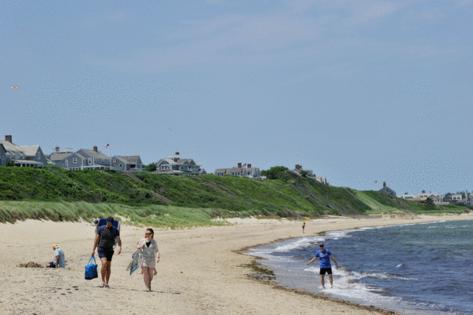Nantucket's economy would be crushed under NOAA proposed restrictions, fast ferry would be gone: UMass report
Published in Business News
BOSTON — What would be the cost of trying to save whales from ship strikes?
Nearly $300 million and 1,500 jobs for the island of Nantucket, according to a new UMass report.
The proposed NOAA vessel speed restrictions would be devastating for Nantucket’s economy and would eliminate all fast-ferry services, the UMass Donahue Institute’s Economic & Public Policy Research Group wrote in a new report.
One-way travel times would increase from 45-60 minutes to 2.5 hours. The Steamship Authority’s ships would also travel slower than they do now, which would reduce daily roundtrips from three to two.
Changes in ferry service would result in a loss of commuters, visitors, and outbound trade, according to the report. The total impact of these changes would lead to a loss of about $286 million in economic activity and 1,500 jobs before accounting for any additional losses due to supply chain constraints and other disruptions.
This amounts to nearly 10% of Nantucket’s current economy and workforce.
“Based on the evidence available to us, we estimate the proposed vessel speed reduction would cause serious harm to Nantucket’s economy and way of life,” reads the UMass Donahue Institute report.
“The speed restriction, if implemented, would impact Nantucket’s economy in three key areas for much of the year,” the report states. “The restriction would likely eliminate the portion of the workforce which commutes daily to the island, make short-stay visits to the island impractical, and reduce the amount of goods reaching the island, increasing the costs of necessary materials for island residents and businesses.”
The National Oceanic and Atmospheric Administration is evaluating changes to the North Atlantic Right Whale Vessel Strike Reduction Rule — which governs vessel speeds along the Atlantic coast.
Under these changes, most vessels 35 feet or longer would be required to travel at speeds of 10 knots or less within active Seasonal Speed Zones to reduce the risk of deadly whale collisions.
According to the new report, about 1,255 workers commute onto the island daily, or nearly 22% of total employment.
“In the event of a speed restriction, a ferry commute roundtrip would be a six-hour journey, making a daily roundtrip impractical,” the report reads. “Assuming the distribution of these commuters across industries is like Nantucket’s overall workforce, the economic impact of lost commuters would be $192 million in economic activity, or seven percent of Nantucket’s total economic output. Tax revenue impacts would be approximately $33 million. Annualized job losses are estimated at 980 (or 1,700 on a seasonal basis).”
The increased travel time to and from the island would also largely eliminate tourists taking day trips or staying for a short time, according to the report.
The estimated spending of these two groups of travelers from November through May is $59 million, representing 53% of seasonal and 18% of annual spending. That would lead to a total loss of economic activity of $72 million, and the loss of 465 jobs and $13.8 million of tax revenues.
The Nantucket police chief noted that the elimination of fast ferry service would hurt with recruiting, training, and retaining police officers. The Nantucket fire chief noted similar impacts on recruitment, training, retention, and collaboration.
Last year, there were 27,353 school or youth group riders on Nantucket’s Hy-line Ferry, an average of more than 2,000 every month. In the event of this rule change, the UMass report said this population would see a “serious reduction” in its ability to engage in sports or off-island learning opportunities.
The Herald reached out to NOAA about the UMass report.
“We cannot speak to the findings of an external study,” a spokesperson said.
The final rule to modify North Atlantic right whale vessel speed regulations is with the White House Office of Information and Regulatory Affairs, part of the Office of Management and Budget.
©2024 MediaNews Group, Inc. Visit at bostonherald.com. Distributed by Tribune Content Agency, LLC.












Comments